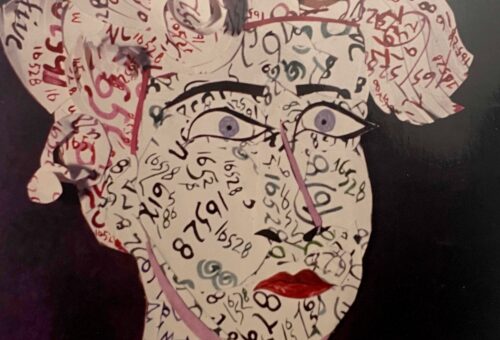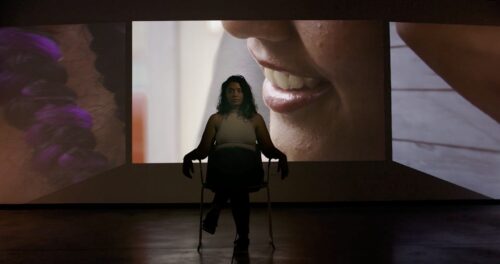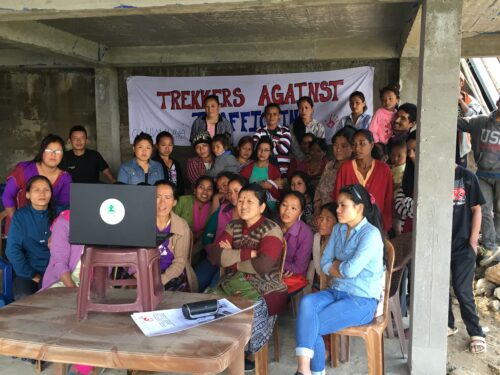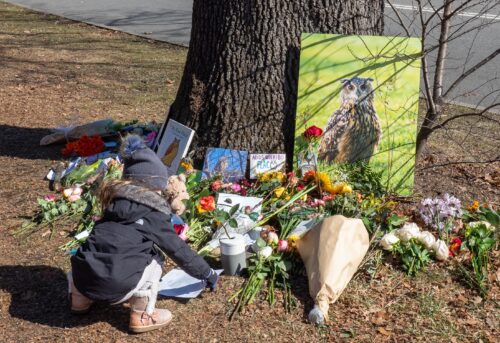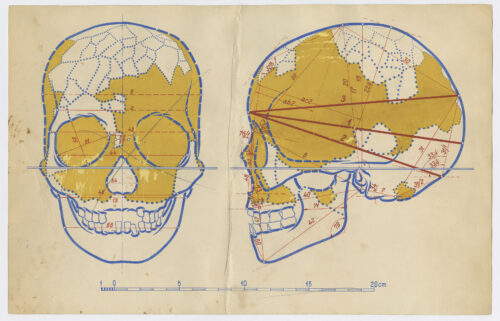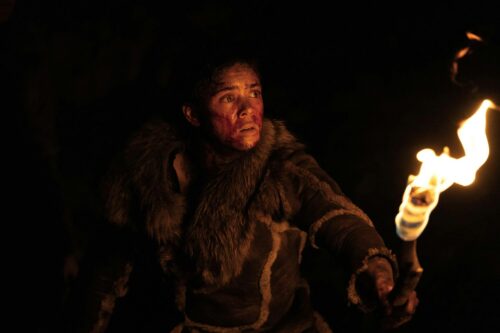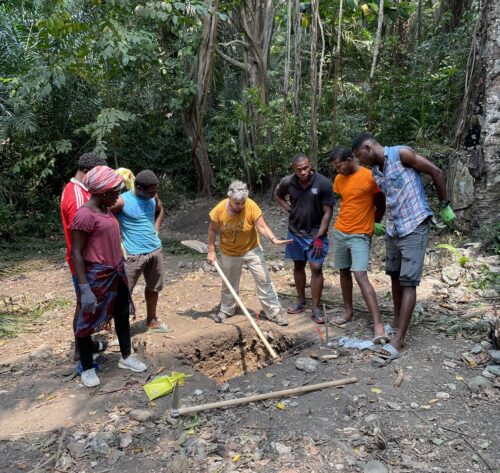Five Questions About Writing the African Diaspora
In this free live event, Yoli Ngandali, SAPIENS Media & Public Outreach Fellow, asks Justin Wright five questions about Lead me to Life: Voices of the African Diaspora, a new collection of poetry and prose from scholars across the African diaspora. Wright is currently a Ph.D. student in anthropology at American University and the poet-in-residence at SAPIENS. Through powerful storytelling and creative scholarship Lead me to Life aims to bring nearer a shared future of safety, vitality, equality, and justice for all.
This text is provided in rough draft format. Communication Access Realtime Translation (CART) is provided in order to facilitate communication accessibility and may not be a totally verbatim record of the proceedings.
>> Yoli Ngandali: Hello and welcome, everyone. We will wait a few moments to allow everyone to join us. Come on in. Hi, welcome. We are just going to wait just a few moments to allow everyone to join us. Hello, welcome. Before we get started, I want to encourage you to click the link in the chat to join our SAPIENS newsletter. This newsletter can keep you up to date with SAPIENS events and keep you and stories every Friday.
All right. All right. So let’s get started. Hello and welcome, everyone. My name is Yoli Ngandali. And I’m the Media and Public Outreach Fellow for SAPIENS. I am here with Justin D. Wright. Justin holds an MA in theater and performance studies from Washington University in Saint Louis, and is currently a Ph.D. student in anthropology at American University.
Justin is also the poet in residence at SAPIENS and here to talk about their contribution to Lead Me to Life: Voices of the African Diaspora. We are so happy to have Justin here with us today. Welcome, Justin.
>> Justin Wright: Hey, thank you. I’m glad to be here. Glad to have this conversation. It’s going to be exciting.
>> Yoli Ngandali: Yeah. I’m excited, too. This will be great. For the people in the audience, if you have any questions for Justin, add them using the Q&A function at the bottom of your screen and we will answer them at the end. So let’s get right into it, Justin, what is Lead Me to Life: Voices of the African Diaspora? What are the goals of this collection of creative works?
>> Justin Wright: So, yeah. So they set down many months ago and thought about what it would be to craft a collection that centers Black voices and voices of the African diaspora. Sos that what this is. It is a collection of these kinds of works that are talking to different aspects of the Black experience and they are talking to those aspects whether or not it’s about history and the culture of these folks or it’s about them reflecting on their contemporary, what’s happening now in the world.
So we put out this call for works so we can have these folks offer their voices speaking to these towards Black liberation and moments of deep grief such as the killings of George Floyd and Breonna Taylor and unfortunately so many more than I can name. But also it speaks to their various cultures and histories and the ways that our past makes residence and echos deep into this present that we live in.
So it takes a creative event and uses storytelling and poetry as a way to reconstruct the narratives of Blackness that are seen through the white gaze, often, right. And these works then work to tear that down. They work to dismantle it. Ethnography and personal experiences to try to reestablish those cultures of Blackness and hopefully, hopefully to help direct us not only towards a new way of knowing and new way of understanding and seeing,
but towards the beginning of new worlds, almost. And I think the goals are also in conversation and they help to further our understandings of the global reckonings that are happening with anti‑Blackness, agoraphobia, anti‑Asian hate, colonialism, slavery, sexism, et cetera. So it’s speaking to all of those.
>> Yoli Ngandali: Mm‑hmm. You talked a little bit about some of the different types of creative works. Can you speak a little bit more on that, about the different types of storytelling and poetry.
>> Justin Wright: Yeah. We have a lot of poetry. There’s, we have a piece or two that are more prose more than creative works, almost short storiesque. Some of the poetry is interesting because it’s not traditional poetry. We have some that’s spoken. We have some the style they take is more what we would think of as prose as blank versus, but in reality works through understandings the poetic language and poeticism and things like that.
So, yeah, it’s a range of creative works.
>> Yoli Ngandali: That’s exciting. I can’t wait to see all of them come out. I am going to move onto my next question. Justin, so how does anthropology inform poetry and creative prose, or is it the other way around? How can poetry inform anthropological scholarship?
>> Justin Wright: Yeah. So I will start with poetry informing anthropology because I don’t like to do anthropology too much. I will talk about it later.
(Laughter)
>> Justin Wright: But I think that poetry can inform anthropology, basically in ways that we learn to take poetry and creative work as truth in and of itself. So it’s like these creative works often speak directly to the authors’ lives, their experiences, cultures, their ways of being, all the ways they cascade around them.
And then to dismiss those works as other than other than the rich experiences and truths they can offer as scholarship. I think. So it’s like think of, I don’t know if you are familiar with William Butler Gates. He’s one of my favorite poets from the late 18th, early 19th century. And his work talks to Irish nationalism and the understanding of who the Irish person is, and galvanizing the Irish people and the powerful sense of their identity and their fights against their oppressors.
But the work also takes into account the heavy cost of war and the pain and the grief therein. Right. And that’s the poem, that’s his poem, the Second Coming, when he says what is it, turning and turning in the widening and the fa falcon not hear, things fall apart. The center cannot hold and everywhere the blood is loosed upon the world and those kinds of things.
Ask goes on to say which I think is the quote we all know and what rough beast in its hour come around at ‑‑ right. And that’s poetry. It’s gorgeous. But it’s also true because it’s experience. It’s also this kind of ethnographic material.
And I mean, I fell into poetry when I was around six, but it’s mainly because I found this edition of civil war poetry. I fell into that history and that’s how I started to understand poetry at such a young age. We refecting on what is happening in life. And as to anthropology informed poetry, for me at least, my language changes.
What I’m looking at when I’m writing a poem, what I’m trying to uncover, I’m going deeper into that because for me anthropology helps to train my mind’s eye to kind of see and to capture, but it also helps me to learn how to give life and voice to otherwise unvoiced truths. Those kinds things.
>> Yoli Ngandali: Mm‑hmm. I really like this idea of truths. Can you expand on that a little bit more? What is the truth‑making? What is the truth‑telling here?
>> Justin Wright: Yeah. So I think, basically I touch on truth a lot because people will often, some people will often denigrate poetry as oh, well it’s not fact. Right. If it’s not fact, t not real. It’s just like a frivolous kind of undertaking almost. But poetry is just another way to speak to someone’s experience. It’s another way for someone to tell their story. So it is that truth.
Regardless of what we think the facts are, what we think happened, it’s that person’s experience of what happened. And that is the truth for that person. That’s the truth for everyone that they tell about that thing and then that becomes the truth that we see in the history back because history is nothing but stories that we tell about our stories that get told about ourselves so many times that we finally get them written down.
So I think I push into truth a lot because, you know, in our efforts to make our ‑‑ in our efforts to make our scholarship and all of those scholarly endeavors that we have matter a lot, we tend to push down things that we can’t prove or we say we can’t prove or measure that are material in that way.
But that’s just not how the world works. That’s not how we experience or how we learn and that’s not how we, you know, take history and disseminate it throughout.
>> Yoli Ngandali: Thank you, thank you for that. Well said there. In your SAPIENS pieces, one theme that comes up is that of Black joy. What does it mean for the diaspora to move beyond sole notions of Black survival into practices of joy and aliveness?
>> Justin Wright: Yeah. So, and I as a side note, I focus on joy specifically because a lot of my scholarly education has been focusing on pain, trauma, and death. Those are my concentrations in undergrad. I’m focusing on all the ways in which we are hurt, Black people are hurt, all the ways we deal with that trauma and how that trauma reflects itself.
So for me, the necessary but also natural next step was to move towards joy because I learned all the ways that we survive, right. But how do we live? And joy is a part of us finding ways to live. And I think that, you know, moving beyond the notion of survival toward aliveness is like how I think of it is the story of Blackness told by white folks and it’s only about that survival. It’s only about the pain. It’s only about the overcoming of pain towards more pain and trauma
and so on and so forth, kind of like how I studied it. And a lot of times it’s only about, Tony vocabulary the metaphor of the water, it’s only about keeping our head above water, our struggle to stay afloat trying to breathe. And if we can’t breathe, at least trying not to drown and it kind of ends there.
But when you think of the stories told by Black folks, it often talks about how we make joy inspire that, how we craft life through grief and death, how we build celebration in the midst of all that pain. How we make joy and then by making joy, how we then live, right. So I think that it’s not saying that thinking about joy and focusing on joy pushes or throws away survival.
Survival is necessary. We have to survive. But joy is a part of survival, but pushes past it in that it helps us how to take that next step and to actually live and be present and figure out how we make a life through that.
>> Yoli Ngandali: Mm‑hmm. What are some of the things that bring you joy?
>> Justin Wright: I had a feeling you might ask that.
(Laughter)
>> Justin Wright: You know, in a very, like, I will say a couple of things. I love being around, you know, my family when I can, and I haven’t been around physically my family a very long time. They live in Alabama. I’m in Saint Louis. Someone’s in D.C. So it’s been a while. But talking, connecting with them, talking and connecting with the friends and things that I have around, tracking that kind of love, those spaces of love
and joy there with my people, and, you know, specifically the Black folks around, around me. But also things that bring me joy, look. I know some people are, like, oh, this is too nerdy, whatever. I don’t care. I love the Marvel stuff. I love the whole MCU thing. I love the Marvel movies. I love the comics.
I’m the type of person who, I have a TikTok specifically to go through all the deep diving theories about what’s in this movie, this and that.
>> Yoli Ngandali: Ahh!
>> Justin Wright: Yeah, that’s a whole conversation. But that’s a part of something that brings me joy.
>> Yoli Ngandali: Mm‑hmm.
>> Justin Wright: And I think thinking about how we make joy in everyday life as Black people is learning, maybe it’s not me dealing with Marvel every day, but it’s learning how my dealings with Marvel make me feel and trying to replicate that feeling in everyday life. How do I take that same joy and take it when I’m walking down the street?
And how does it change my perspective, how I think about myself?
>> Yoli Ngandali: Thank you, thank you. And to everybody in the audience, if you have any questions for Justin, go ahead and put them in the Q&A function. All right. Let’s keep going here. So Justin, what is your own story? What are a few important things that we should know about you and how you approach your work as an anthropologist and a poet?
>> Justin Wright: So what is my story? My story is ‑‑
>> Yoli Ngandali: For every ‑‑
>> Justin Wright: Yeah, yeah. Well, my story is Black, right, and I grew up in Alabama. I’m from Alabama, the deep South with all of the things that that entails, Birmingham specifically. When I tell somebody I’m from Birmingham, without fail they always say oh, that place has a lot of history. And it’s, like, yes, I know it has a lot of history.
I know exactly where all these landmarks are. I walked through them all my life. But I think that is a part of me that has informed how I deal with my own poetry, too, as a kind of quick side note, I went to a type of high school that was an IB high school which was kind of like a magnet school in that way. But it was majority white, predominantly white. My undergrad was also predominantly white and privileged in that manner.
And what I did was I tried to cut out my accent. Tried to code switch so much that it knocked it out. But what I realized was as I was writing my poetry, my poetry was bad until I started writing the accent, you know, that I naturally speak which is why a lot of my poetry reflects how I talk and how I speak and all that kind of stuff.
But that’s just, like, an example of how, like, how much poetry means to me and how much it’s a part of me. And I think also with that poetry is my lens for me. It’s a lens through which I see the world. And I engage in, like, a kind of poetic methodology in everything that I do, all of the scholarly stuff that I write.
It may annoy some professors that I don’t care. That’s how I write and I am going to write. But I do it because my family speaks in a manner that’s almost akin to poetry, akin to musicality and this kind of stuff. We use these grand metaphor and analogies to talk about life. And for me to try to remove that from my work and everything that I do means I’m not being true to myself or my culture or my history.
And to kind of hit back on the kind of fact and truth point, I think, there is a truth in metaphor that I think gets obscured by what people assume is fact. And they think fact is in direct opposition to metaphor, to embellishment and that reality is that truth is made up of ‑‑ but the reality is that truth is made up of, like, all of these embellishments, all of these stories that we have.
And it’s, like, think about, there’s an older grandparent or whatever. Somebody’s grandma, somebody’s grand dad and they have been married about fifty years. You listen to them tell the story about how they met each other. And the reality is they probably met at a coffee shop, they sat down and talked for an hour.
But you hear him talk about it, he talks about how his stomach fluttered the first time he looked into his hers. She talked about how his voice sounded like flutes and there was that musicality. Than that wrote explanation they gave the first time because that’s about how they felt. It’s about what they experienced when they talked to each other when they saw that the first time and that’s more factual than anything else.
So, yeah.
>> Yoli Ngandali: Oh, that’s really beautiful. I can see a lot of parallels in my life, too, and family in that way. It’s time to take some questions from the audience. And so I actually have a couple good ones here. So let’s start with, has editing this collection changed you in any way? So this Lead Me To Life.
>> Justin Wright: I wouldn’t say it’s changed me. I think it’s helped me continue along the path that was already happening. Sometimes you get into a space where you think that you are writing to yourself almost and you are writing in an echo chamber or that you mistakenly think that you are the only person who is writing about this.
And then you realize, oh, here are all of these submissions. Oh, no, we are all trying to figure out the same stuff or figure through the same stuff albeit different ways, different particulars, but we are thinking through that. More people talk about joy and joy is a form of survival.
And I thought more people are using metaphors in a way that I understand. I think a beautiful thing, too, is that there are some, you know, cultures that are presented in the collection that I’m closer to. People who are maybe born in the U.S. or have a certain type of understanding or they grew up in the U.S. Black southernness, almost.
And I remember I read one of the pieces. It was actually one of, I think this is one of them, but it was two of the pieces. It was actually one of the pieces from the author that just got published first in the collection Jason Vasser‑Elong and his poem Elder. And I said I know exactly how this feels.
Like, you are talking about this ride in the car. I could feel it. I could understand it. And I was, like, oh, because I have been in a situation like that moving through, like, all of these fields, playing, you know, back in the creek, all this other kind of stuff. What does he say?
I think he says, like, in the poem and please, everyone, go read it. It’s a gorgeous beautiful poem. But I think he says toward the end of it, and Jayron can tell you with certainty how many rows of corn were in the field or how the grass is a great mattress full of the comfort we somehow miss. And I completely understood what that meant.
The grass being a mattress of comfort for me, especially coming from, and so, you know, you get a little longwinded I guess. But I just think that not necessarily changed me, but it helped me understand that I’m not alone and n how I’m thinking. I’m not the only one writing about this. And I’m just one among many people who are doing this very sometimes tiring, but hopefully it’s very great and fulfilling work of putting your experiences out there in that kind of way.
>> Yoli Ngandali: Mm‑hmm. Well, I have to do one more bones question because it’s a really great question before we go here. What words do you have for future anthropologists, especially our young Black anthropology students?
>> Justin Wright: Ahh! These are the questions that always trip me up. I think that part of, and this is advice that as I have understood and I have experienced, will be sometimes in opposition to your ‑‑ to what you are being told sometimes in programs and to things like that.
But you have to at all costs try not to compromise yourself and compromise what you believe in, what you believe is the right thing to do, how you believe, you know, in your heart what you are studying, who you are studying, who you are studying with, those kinds of things, the work that you are doing, and trying not to compromise that.
It goes to even as simple as, you know, I talk about a poet methodology, but I’ve learned not to compromise my poetic voice in my scholarly writing. And that may be simple, but I have learned not to compromise it because the second I compromise it, my writing is not as great. To me it’s not as full as it needs to be.
But it also isn’t indicative of what I’m trying to do and that’s how your project, your scholarship, something that is so dear to you can become somebody else’s or can become a mold of somebody else if you let that compromise there. And sometimes it will put you in binds. You will have arguments with advisors and things like that.
I have had quite a few of those kinds of arguments with professors and advisors and things like that. But young anthropologists still in the early stages of their kind of work, too, but pushing through that and learning to keep hold of what you know to be true, your truth. I think that is the advice I would give. I play that back in my head and it feels a little all over the place, but there’s something in there.
>> Yoli Ngandali: No, that was beautiful. Definitely needed to hear that. So that is it. We are almost out of time. Thank you, Justin for being here. If this has piqued your interest, go and read Justin’s many SAPIENS pieces at SAPIENS.org. The link is in the chat.
And then also keep a lookout for other contributors in Lead Me to Life: Voices of the African Diaspora in the coming weeks. Jason Vasser‑Elong’s piece Elder is out now and that link was put in the chat as well.
But contributions from Leah Zani, Dina Rivera, Laara de Paula Pahsus, Cory‑Alice, Andre‑Johnson, Traben Pleasant, and Irma McClaurin are all coming soon. So please come back next month and we will have another Five Questions event. Thank you again and have a wonderful day!


